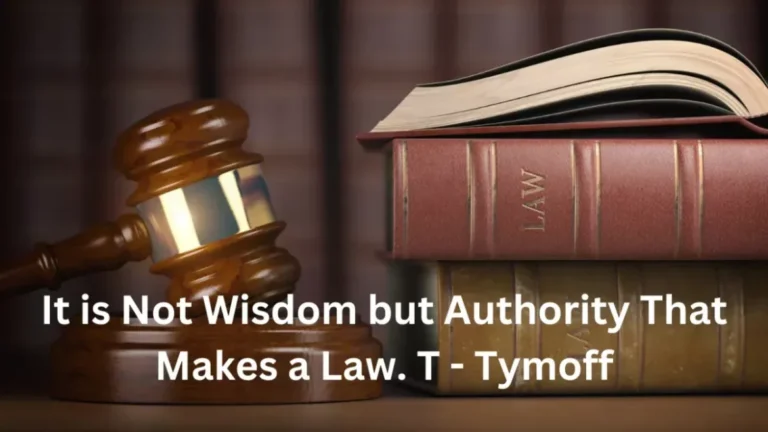Introduction
The statement “It Is Not Wisdom But Authority That Makes a Law. T – Tymoff, provokes critical examination of the relationship between authority and the legal frameworks that govern society. This assertion suggests that the validity of laws arises not from their moral or intellectual merit but from the power structures that enforce them. In this article, we will explore the implications of Tymoff’s perspective, analyzing how authority shapes laws, the consequences of this dynamic, and the importance of integrating wisdom into the law-making process.
Understanding Law and Authority
To fully grasp the meaning behind Tymoff’s statement, we must first define the nature of law and its relation to authority. Laws are formal rules created to regulate behavior within a society, serving to maintain order and justice. However, the legitimacy of these laws often hinges on the authority behind them.
The Concept of Authority
Authority can be defined as the power or right to give orders, make decisions, and enforce obedience. In the context of law, this authority typically resides with governments, legislative bodies, and judicial systems. However, the source of this authority and its legitimacy is complex and multifaceted.
- Legal Authority: This stems from established legal systems, where laws are created and enforced according to prescribed procedures. The rule of law is a foundational principle in many democratic societies, emphasizing that laws must be applied equally and fairly.
- Traditional Authority: Some laws emerge from long-standing customs and practices, often reflecting the values and beliefs of a culture. This type of authority is deeply rooted in societal norms and can be resistant to change.
- Charismatic Authority: In certain situations, the authority of laws is derived from the personal qualities of influential leaders. This form of authority can lead to laws that may not be based on collective wisdom but rather on the appeal of a single individual.
The Role of Wisdom in Law
Tymoff’s assertion highlights the potential absence of wisdom in lawmaking. While laws can be authoritative, they may not necessarily reflect moral or ethical considerations. This distinction raises significant questions:
- Moral Legitimacy: Laws can be legally enforceable yet morally questionable. Historical examples include laws that allowed slavery or enforced segregation. Such laws were upheld by authority but lacked the wisdom that aligns with human rights.
- Flexibility vs. Rigidity: Legal systems often become rigid, prioritizing adherence to established laws over adapting to societal changes. This rigidity can hinder justice and progress.
- Power Dynamics: The influence of those in power can shape laws to serve specific interests rather than the common good. This underscores the need for vigilance in the law-making process to ensure diverse perspectives are considered.
Consequences of Authority-Driven Laws
The reliance on authority rather than wisdom in the creation of laws can have profound implications for society.
Social Justice and Equity
When laws are made without considering ethical wisdom, they can perpetuate social injustices. Legislation that favors certain demographics can entrench inequality, leaving marginalized groups without necessary protections. This highlights the importance of inclusive law-making processes that consider the voices of all community members.
Civil Disobedience as a Response
In cases where authority-driven laws are perceived as unjust, civil disobedience becomes a powerful tool for change. Individuals and movements may choose to defy laws to advocate for justice based on ethical principles. This dynamic has played a significant role in various social movements throughout history, challenging the legitimacy of authority that lacks moral grounding.
The Necessity of Critical Discourse
Tymoff’s statement calls for ongoing dialogue about the nature and validity of laws. Societies must engage in discussions that scrutinize the authority behind legislation and its alignment with collective wisdom. This discourse is crucial for fostering democratic values and ensuring that laws evolve in response to societal needs.
Striking a Balance Between Authority and Wisdom
While authority is necessary for the enforcement of laws, integrating wisdom into the law-making process is vital for justice and equity. Several approaches can help achieve this balance.
Inclusive Law-Making Processes
Encouraging participation from diverse community members, including marginalized voices, can lead to more equitable legislation. Engaging a variety of perspectives helps ensure that laws reflect the collective wisdom of society, rather than merely the interests of those in power.
Promoting Legal Education and Awareness
Educating citizens about their rights and the implications of laws fosters an informed populace. When individuals understand the laws that govern them, they are better equipped to advocate for changes that reflect wisdom and ethical considerations.
Also Read: Learn to Sit Back and Observe. Not Everything Need – Tymoff
Ethical Leadership
Leaders in legal and political fields must prioritize ethical considerations in their decision-making processes. By fostering values of justice and integrity, leaders can wield authority responsibly, ensuring that laws align with societal wisdom.
Conclusion
“It Is Not Wisdom But Authority That Makes a Law. T – Tymoff aptly stated, prompts us to critically assess the foundations of our legal systems. While authority is crucial for the creation and enforcement of laws, the absence of wisdom can lead to significant ethical challenges. Striving for a balance between authority and wisdom is essential for developing legal frameworks that uphold justice and reflect the values of society.


